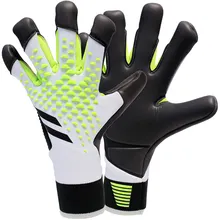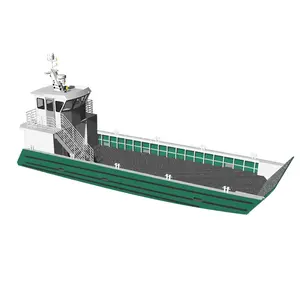What are Barges
Barges represent a class of flat-bottomed, broad vessels primarily designed for transporting heavy goods along rivers and canals. Due to their unique design, they are particularly well-suited for the task of carrying large and oversized cargo which might be challenging for other forms of transportation. These vessels are integral to the maritime industry, serving as the backbone for the movement of bulk commodities.
The use of barges is diverse, catering to various sectors such as construction, where they transport materials like gravel and sand; agriculture, for carrying grains; and even in the energy sector, where they move coal and oil. They are also used in dredging operations to remove sediments from waterways, ensuring navigational routes remain clear for other vessels.
Barges function by floating on water; their flat bottoms allow them to carry heavy loads without sinking. They can be self-propelled or more commonly, moved by towboats or tugboats. The simple yet robust engineering behind these vessels enables them to transport substantial weights over long distances economically. They also play a crucial role in intermodal transport systems, where goods are transferred from ships to barges and then to trucks or trains, creating an efficient supply chain.
Types of Barges
The variety of barges available is tailored to suit different transportation needs and operational environments. Each type is designed with specific features that optimize it for its intended use:
Deck Barge: This is a multipurpose barge that is primarily flat on top. It's used for carrying cargo that is too bulky or heavy for traditional shipping containers, such as large construction materials or machinery.
Hopper Barge: These are used for transporting bulk commodities such as coal, sand, and gravel. They feature an open hold that can be easily loaded and unloaded with cranes or buckets.
Tank Barge: Designed to safely carry liquid cargo such as petrochemicals or fresh water, tank barges are equipped with specialized storage facilities to prevent spills and contamination.
Split Hopper Barge: This type of barge can open its hull to dump cargo like dredged material into the water. It's commonly used in dredging operations to transport and dispose of sediment.
Barracks Barge: Used as living quarters for workers on marine job sites, they provide accommodation facilities that can be moved to different locations as required.
Each type offers different capacities and features that make them suitable for their specific tasks within the wider marine industry’s operations.
How to choose Barges
When selecting barges for business purposes, it's essential to consider the nature of the cargo, route, and operational requirements. Here's how businesses can make an informed decision:
Cargo Type and Capacity: Match the barge type with the material you need to transport. Deck barges are ideal for heavy or large items, while hopper barges are best for bulk materials like grain or coal.
Route Specifications: Consider the waterways you’ll be navigating—some barges are better suited for narrow canals, while others are built for open sea conditions.
Power Type: Decide between self-propelled barges or those that require tugboats based on availability and cost-effectiveness in your operation area.
Material and Construction: Ensure the barge’s construction—be it steel or aluminum—is suitable for your cargo’s weight and the water type it will traverse.
Regulatory Compliance: Check that the barge meets all safety and environmental regulations applicable in the intended operational jurisdictions.
After-sales Service: Look into the after-sales services offered by suppliers, including maintenance and repair services which can be crucial in ensuring operational continuity.
By considering these factors, businesses can choose barges that not only meet their transportation needs but also align with operational efficiency and regulatory compliance.
Best Barges on Alibaba.com
Alibaba.com stands out as a global marketplace connecting businesses with a wide range of barge suppliers that offer various types suitable for different industrial needs. Whether it's transporting raw materials across continents or supporting construction projects in remote locations, Alibaba.com provides access to a diverse fleet of barges designed to meet specific commercial requirements. With suppliers from over 190 countries providing detailed machinery test reports and after-sales service options, businesses can make informed decisions when sourcing these vital marine vessels. Furthermore, Alibaba.com’s Trade Assurance service ensures that payments are protected until delivery is completed, providing buyers with a level of security that underscores the platform's commitment to quality and dependability in international trade. By choosing Alibaba.com, businesses gain access not only to a vast selection of products but also to a platform designed with features that streamline purchasing processes across languages and devices - making global trade more accessible than ever before.
Common FAQs for Barges
What are the primary uses of barges in commercial industries?
Barges are primarily used for transporting heavy and bulky goods, particularly across waterways. They serve industries such as construction, agriculture, and energy by moving materials like gravel, grains, and fuel.
How do I determine the carrying capacity of a barge?
The carrying capacity of a barge is determined by its size, design, and the material it is made from. Suppliers typically provide specifications including dimensions and maximum load capacity to help businesses choose the appropriate barge for their needs.
Can barges be customized according to specific business requirements?
Yes, many suppliers offer customization options for barges. This can include alterations to the hull material, size, and additional features such as crane fittings or specialized storage compartments.
What are the considerations for choosing between a steel or aluminum barge?
Choosing between a steel or aluminum barge depends on factors such as weight of the cargo, the type of waterways it will navigate, and durability requirements. Steel is stronger and more durable but heavier, while aluminum is lighter but less durable than steel.
How does the power type of a barge affect its operation?
The power type of a barge, whether diesel or electric, affects its operational cost, environmental impact, and maintenance needs. Electric barges are quieter and may have lower emissions, while diesel barges are often more powerful and have longer range.
What kind of after-sales services are provided with barges?
After-sales services for barges can include engineers available to service machinery overseas, video technical support, online support, field maintenance, and repair service. The availability of these services varies by supplier.
How do I ensure that the barge complies with local regulations?
Businesses should inquire about the class and certification of the barge (e.g., ABS or GL) to ensure compliance with local maritime safety and environmental regulations in their operational jurisdiction.
What types of materials can be transported with a hopper barge?
Hopper barges are designed to transport bulk materials such as coal, sand, gravel, and other similar commodities that can be easily loaded and unloaded using cranes or buckets.
Are there barges available for specialized applications like dredging or living quarters?
Yes, there are specialized barges such as split hopper barges designed for dredging operations and barracks barges that provide living quarters for workers on marine job sites.
What should I consider when selecting a barge for river versus sea transport?
For river transport, consider barges with shallow drafts that can navigate narrower and shallower waterways. For sea transport, opt for barges with sturdier construction that can withstand open sea conditions and heavier swells.
How important is the hull material in selecting a barge?
The hull material is crucial for determining the durability and suitability of a barge for specific environments and cargo types. It also affects maintenance requirements and the overall lifespan of the vessel.
Can I find environmentally friendly barge options on Alibaba.com?
While Alibaba.com is a marketplace platform that connects buyers with suppliers offering various types of barges, including those that may have features aimed at reducing environmental impact such as electric-powered options.
What factors influence the stability of a barge?
The stability of a barge is influenced by its design, particularly hull shape and weight distribution. Proper loading practices are also critical in maintaining stability during operations.
How does Alibaba.com ensure the quality of barges listed on its platform?
Alibaba.com offers Trade Assurance which helps protect buyers by ensuring suppliers meet certain quality standards. However, it's important for buyers to also perform their due diligence when selecting suppliers.
Is it possible to track the manufacturing process of a custom-ordered barge through Alibaba.com?
The ability to track the manufacturing process depends on the supplier’s willingness to provide updates. Buyers can use Alibaba.com's communication tools to stay in touch with suppliers during production.










































 浙公网安备 33010002000092号
浙公网安备 33010002000092号 浙B2-20120091-4
浙B2-20120091-4